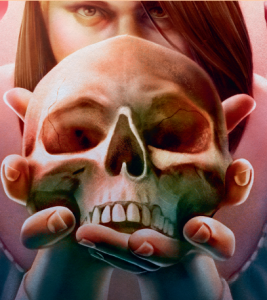 Made Glorious
Made Glorious
By Lindsay Eagar
Shakespeare’s works have proven to be fertile ground for YA reinventions, with the romance, heartbreak, and betrayals of high school easily slotting into the Bard’s most dramatic plays. Unlike other recent outings such as Twelfth Grade Night (BCCB 9/22) and Foul is Fair (BCCB 3/20), however, this month’s Big Picture eschews comedy or tragedy to instead mine the history plays, namely Shakespeare’s Richard III, and cast a seventeen-year-old drama kid in the role of a charismatic, unapologetically villainous protagonist. Both loving and scathing in this assessment of theatre kid culture, Eagar (The Family Fortuna, BCCB 4/23) brings a tremendous facility of form and voice to bear on this delightfully over-the-top novel.
It’s her senior year at Bosworth Academy, and Rory King is ready for—and more pointedly, deserving of—the prestigious drama department’s spotlight. Everyone knows that the magnetic, cutthroat drama teacher only gives starring roles to seniors, and for years, Rory’s played one-line parts, helped behind the scenes, and made herself indispensable in preparation for this moment. The role of Joetta the Fox Maiden in this year’s musical, Good Knight! Sweet Lady, is as prime as it gets: “She’s the rare female character who gets the bulk of the good songs, and it’s a show-stealing part . . . Joetta’s the role of every theatre girl’s dreams. Every senior would die to play this part.” And while the world may see Rory as a poor, fat, scholarship student—ensemble material only—she’ll stop at nothing to get what she thinks is owed to her. If that means plotting against her friends and acquaintances, manipulating the adults in her life, and endangering other students’ futures, well, it’s all in pursuit of her rightful role.
The novel is not meant to be comfortable or to cater to a moral purity discourse, and Rory challenges readers to examine their own pleasure in her cleverness and misdeeds. There’s a perverse satisfaction in watching a sympathetic protagonist do terrible things for understandable reasons, in watching a fictional someone else break the rules from the comfortable distance of real life. The narration slips between first- and third-person as Rory inhabits the story she tells and bends the world to her will. Metanarratives in the form of script scenes and even a Broadway-style music score highlight just how much of the story is about the power of narrative and heighten the climactic collision between Rory’s star turn and everything she does to get it. The late ’90s/early 2000s setting adds a touch of trending nostalgia, but mostly functions to keep the machinations low-tech and the focus on our leading lady: emphasizing what she does, not the minutiae of how she does it, except when logistics provide an opportunity to deepen her character.
Behind the subversive glee of the reading experience, Eagar crafts Rory’s character thoughtfully. The qualities that determine Richard’s social otherness in Richard III—his hunched back and mobility differences, his status as a younger son—are recast here as body size and social class. As a fat girl, Rory is aware that she doesn’t match what audiences expect a leading lady to look like. The narrative knows perfectly well that associating larger bodies with desire-driven villainy is a problematic stereotype. It forces readers to examine uncomfortable junctures between the desire for “positive” representation of bodies in literature and the truth that no character can be realistically human if not permitted to make bad choices as well as morally approved ones.
There’s lots of space here for big questions about the role of fiction, oppression, and representation, and what happens when institutions break their promises. It’s a smart, funny ride that’s masterfully assembled, and steering the trainwreck is a girl furious at being expected to play every role except the one she wants. Unforgettable, this is a delightfully biting counterpoint to more lighthearted high school Shakespeare titles.
—Fiona Hartley-Kroeger, Reviewer
Cover illustrations from MADE GLORIOUS. Illustrations copyright © 2024 by Deena So’Oteh.
Reproduced by permission of the publisher, Candlewick Press, Somerville, MA.

